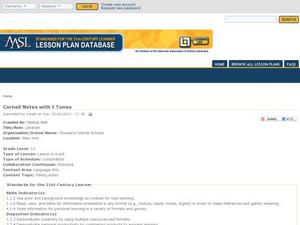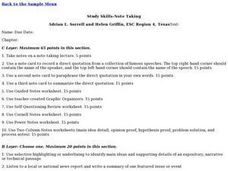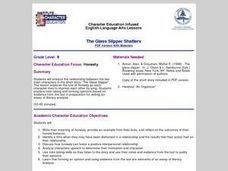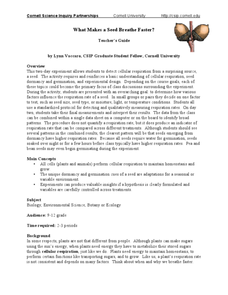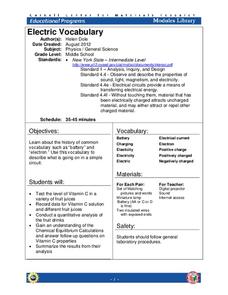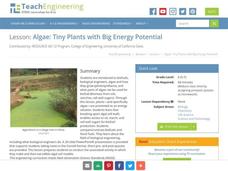University of Tennessee
Note-Taking Skills (Cornell)
Taking good notes is key to success in academic classes. How to take good notes is the focus of this five-page packet that introduces the Cornell, the Five R's, and the SQ3R methods of note taking in one study skills lesson.
Curated OER
Cornell Notes with I Tunes
Note taking is an invaluable skill and requires practice. This lesson incorporates the Cornell Notes format, however the plan itself could be implemented to teach any style. The basic idea here is to use university lectures on podcasts...
Curated OER
Note-Taking Skills
Students take a closer look at their note-taking skills. In this communication lesson, students summarize information by taking notes using the various methods that their instructor presents to them.
Curated OER
Cornell Notes
Students engage in a activity that is concerned with the introduction of The Cornell Notetaking System and the emphasis is upon the active learning that is involved. They discuss and demonstrate the six steps of taking Cornell Notes.
Curated OER
Putting it all Together
Students take notes and summarize information. In this communication lesson, students summarize information by taking notes using the various methods that their instructor presents to them.
Cornell University
Fibers, Dyes, and the Environment
Nanofibers can be made through electrospinning or force spinning in order to reduce the negative impact on the environment. Pupils study the role of fibers and dye on the environment through a series of five hands-on activities. Then,...
Curated OER
Cattle Drive Research
Students research the live of cowboys in 18th Century America. For this cattle drive lesson, students locate a variety of online resources and take notes. Students compile notes and write a brief report.
Curated OER
Study Skills-Note Taking
Students use a note card to record a direct quotation from a collection of famous speeches. The top right-hand corner should contain the name of the speaker, and the top left-hand corner should contain the name of the speech.
Orange County Department of Education
The Glass Slipper Shatters
High school freshmen craft their own definition of honesty. They provide an example from their lives and reflect on the outcomes of their honest behavior. They also identify a time when they may have been dishonest in a relationship and...
Curated OER
What Makes a Seed Breathe Faster?
Here's a five-star lesson plan in which inquisitors conduct sophisticated experimentation with cellular respiration in plant seeds. Placing seeds in a closed system they measure the amount carbon dioxide produced and relate it to...
Cornell University
Electric Vocabulary
Practice electric vocabulary using multiple methods. Learners begin by watching a video that explains vocabulary related to electric currents. They match vocabulary cards to practice and then create an electric circuit. Using the...
Cornell University
Making a Battery
Don't be shocked when your class has a blast making their own batteries! Science scholars examine a dry cell battery, then design and construct a wet cell battery. The activity guides them through the parts of a battery, the variables...
Curated OER
Feudal Japan and the Samurai
Students study the similarities of Feudal Japan and Europe. They show the feudal society of Japan, recognize the role of the samurai and identify the code of bushido.
Curated OER
Characteristics of Living Things
Seventh graders identify the characteristics of living and non-living things. In this biology lesson, 7th graders define vocabulary words as they go through the lesson. They answer a crossword puzzle after class discussion.
Curated OER
Lab 2: Drag Racing
For this lesson, students, Analyze the relationship between velocity and acceleration * Calculate an object's average acceleration * Collect data and interpret it* Create and analyze a graph showing acceleration.Students also work in...
Curated OER
Confucianism: A Cornerstone
Studetns comprehend that confucianism is an important underlying philosophy permeating East Asian cultures. They also explore who Confucius was and what he taught, which helps them gain insight into East Asian cultures. Students...
Cornell University
The Physics of Bridges
Stability is key when building a bridge. Scholars explore the forces acting upon bridges through an analysis of Newton's Laws and Hooke's Law. The activity asks individuals to apply their learning by building a bridge of their own.
Cornell University
Predicting Chemical Reactions
Prove the Law of Conservation of Mass through a lab investigation. A well-designed lesson asks groups to combine materials and monitor indicators for chemical reactions. Measuring the mass of the reactants and products allows individuals...
Cornell University
Bridge Building
Bridge the gaps in your knowledge of bridges. Individuals learn about bridge types by building models. The activity introduces beam bridges, arch bridges, truss bridges, and suspension bridges.
Cornell University
Chemical Reactions
Investigate the Law of Conservation of Mass through a lab exploration. Individuals combine materials to initiate chemical reactions. They monitor for signs of reactions and measure the masses before and after the reactions for comparison.
Curated OER
What would you do if faced with this problem?
Students determine how and why an individual from each of four disciplines - Buddhism, Taoism, Confucianism, and Legalism - might respond to the same problem.
Curated OER
Glimpses of Japan: Picture books are an avenue to geographical knowledge
Student gains insight into the culture of Japan. They articulate the main ideas and supporting details, also they create a "glimpse of Japan" with an illustrated and written summary of the main idea and four supporting details from the...
Curated OER
Along the Birdhouse Trail
Students set up and maintain birdhouses on the school grounds in an effort to witness and capture (through video and photos) the major stages in the life cycle of cavity-nesting birds.
Teach Engineering
Algae: Tiny Plants with Big Energy Potential
My, what big energy potential you have! Scholars learn about the energy potential of using algae as a biofuel. A PowerPoint presentation first describes the structure of algae and then how researchers use algae as biofuel to produce energy.



